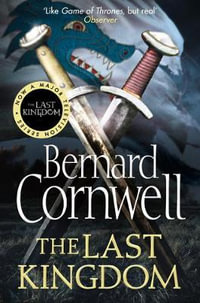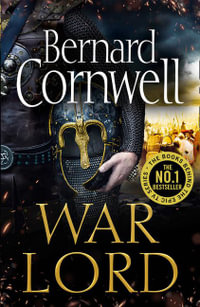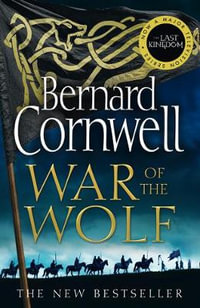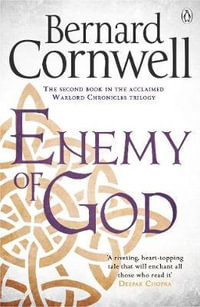
At a Glance
327 Pages
2.2 x 19.7 x 13
Paperback
RRP $22.99
$21.90
or 4 interest-free payments of $5.47 with
In the middle years of the ninth-century, the fierce Danes stormed onto British soil, hungry for spoils and conquest. Kingdom after kingdom fell to the ruthless invaders until but one realm remained. And suddenly the fate of all England—and the course of history—depended upon one man, one king.
From New York Times bestselling storyteller Bernard Cornwell comes a rousing epic adventure of courage, treachery, duty, devotion, majesty, love, and battle as seen through the eyes of a young warrior who straddled two worlds.
About the Author
Bernard Cornwell is the author of the acclaimed Richard Sharpe series, set during the Napoleonic Wars; the Nathaniel Starbuck Chronicles, about American Civil War; the Warlord Trilogy, about Arthurian England; and, most recently, Stonehenge 2000 B.C.: A Novel and The Archer's Tale.
Bernard Cornwell worked for BBC TV for seven years, mostly as producer on the Nationwide programme, before taking charge of the Current Affairs department in Northern Ireland. In 1978 he became editor of Thames Television's Thames at Six. Mr. Cornwell lives with his wife on Cape Cod.
Industry Reviews
The Danes were clever that day. They had made new walls inside the city, invited our men into the streets, trapped them between the new walls, surrounded them, and killed them. They did not kill all the Northumbrian army, for even the fiercest warriors tire of slaughter and, besides, the Danes made much money from slavery. Most of the slaves taken in England were sold to farmers in the wild northern isles, or to Ireland, or sent back across the sea to the Danish lands, but some, I learned, were taken to the big slave markets in Frankia and a few were shipped south to a place where there was no winter and where men with faces the color of scorched wood would pay good money for men and even better money for young women.
But they killed enough of us. They killed Ælla and they killed Osbert and they killed my father. Ælla and my father were fortunate, for they died in battle, swords in their hands, but Osbert was captured and he was tortured that night as the Danes feasted in a city stinking of blood. Some of the victors guarded the walls, others celebrated in the captured houses, but most gathered in the hall of Northumbria's defeated king where Ragnar took me. I did not know why he took me there, I half expected to be killed or, at best, sold into slavery, but Ragnar made me sit with his men and put a roasted goose leg, half a loaf of bread, and a pot of ale in front ofme, then cuffed me cheerfully round the head.
The other Danes ignored me at first. They were too busy getting drunk and cheering the fights that broke out once they were drunk, but the loudest cheers came when the captured Osbert was forced to fight against a young warrior who had extraordinary skill with a sword. He danced around the king, then chopped off his left hand before slitting his belly with a sweeping cut and, because Osbert was a heavy man, his guts spilled out like eels slithering from a ruptured sack. Some of the Danes were weak with laughter after that. The king took a long time to die, and while he cried for relief, the Danes crucified a captured priest who had fought against them in the battle. They were intrigued and repelled by our religion, and they were angry when the priest's hands pulled free of the nails and some claimed it was impossible to kill a man that way, and they argued that point drunkenly, then tried to nail the priest to the hall's timber walls a second time until, bored with it, one of their warriors slammed a spear into the priest's chest, crushing his ribs and mangling his heart.
A handful of them turned on me once the priest was dead and, because I had worn a helmet with a gilt-bronze circlet, they thought I must be a king's son and they put me in a robe and a man climbed onto the table to piss on me, and just then a huge voice bellowed at them to stop and Ragnar bullied his way through the crowd. He snatched the robe from me and harangued the men, telling them I knew not what, but whatever he said made them stop and Ragnar then put an arm around my shoulders and took me to a dais at the side of the hall and gestured I should climb up to it. An old man was eating alone there. He was blind, both eyes milky white, and had a deep-lined face framed by gray hair as long as Ragnar's. He heard me clamber up and asked a question, and Ragnar answered and then walked away.
'You must be hungry, boy,' the old man said in English.
I did not answer. I was terrified of his blind eyes.
'Have you vanished?' he asked. 'Did the dwarves pluck you down to the underearth?'
'I'm hungry,' I admitted.
'So you are there after all,' he said, 'and there's pork here, and bread, and cheese, and ale. Tell me your name.'
I almost said Osbert, then remembered I was Uhtred. 'Uhtred,' I said.
'An ugly name,' the old man said, 'but my son said I was to look after you, so I will, but you must look after me too. You could cut me some pork?'
'Your son?' I asked.
'Earl Ragnar,' he said, 'sometimes called Ragnar the Fearless. Who were they killing in here?'
'The king,' I said, 'and a priest.'
'Which king?'
'Osbert.'
'Did he die well?'
'No.'
'Then he shouldn't have been king.'
'Are you a king?' I asked.
He laughed. 'I am Ravn,' he said, 'and once I was an earl and a warrior, but now I am blind so I am no use to anyone. They should beat me over the head with a cudgel and send me on my way to the netherworld.' I said nothing to that because I did not know what to say. 'But I try to be useful,' Ravn went on, his hands groping for bread. 'I speak your language and the language of the Britons and the tongue of the Wends and the speech of the Frisians and that of the Franks. Language is now my trade, boy, because I have become a skald.'
'A skald?'
'A scop, you would call me. A poet, a weaver of dreams, a man who makes glory from nothing and dazzles you with its making. And my job now is to tell this day's tale in such a way that men will never forget our great deeds.'
'But if you cannot see,' I asked, 'how can you tell what happened?'
Ravn laughed at that. 'Have you heard of Odin? Then you should know that Odin sacrificed one of his own eyes so that he could obtain the gift of poetry. So perhaps I am twice as good a skald as Odin, eh?'
ISBN: 9780007218011
ISBN-10: 000721801X
Series: Saxon Chronicles
Published: 3rd October 2005
Format: Paperback
Language: English
Number of Pages: 327
Audience: Professional and Scholarly
Publisher: HarperCollins Publishers
Country of Publication: GB
Dimensions (cm): 2.2 x 19.7 x 13
Weight (kg): 0.246
Shipping
| Standard Shipping | Express Shipping | |
|---|---|---|
| Metro postcodes: | $9.99 | $14.95 |
| Regional postcodes: | $9.99 | $14.95 |
| Rural postcodes: | $9.99 | $14.95 |
How to return your order
At Booktopia, we offer hassle-free returns in accordance with our returns policy. If you wish to return an item, please get in touch with Booktopia Customer Care.
Additional postage charges may be applicable.
Defective items
If there is a problem with any of the items received for your order then the Booktopia Customer Care team is ready to assist you.
For more info please visit our Help Centre.
You Can Find This Book In
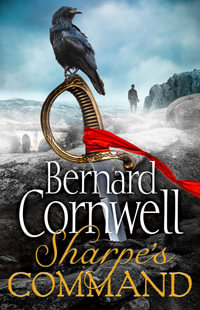
BOXING DAY
Paperback
RRP $32.99
$13.25
OFF

BOXING DAY
Paperback
RRP $32.99
$13.25
OFF
